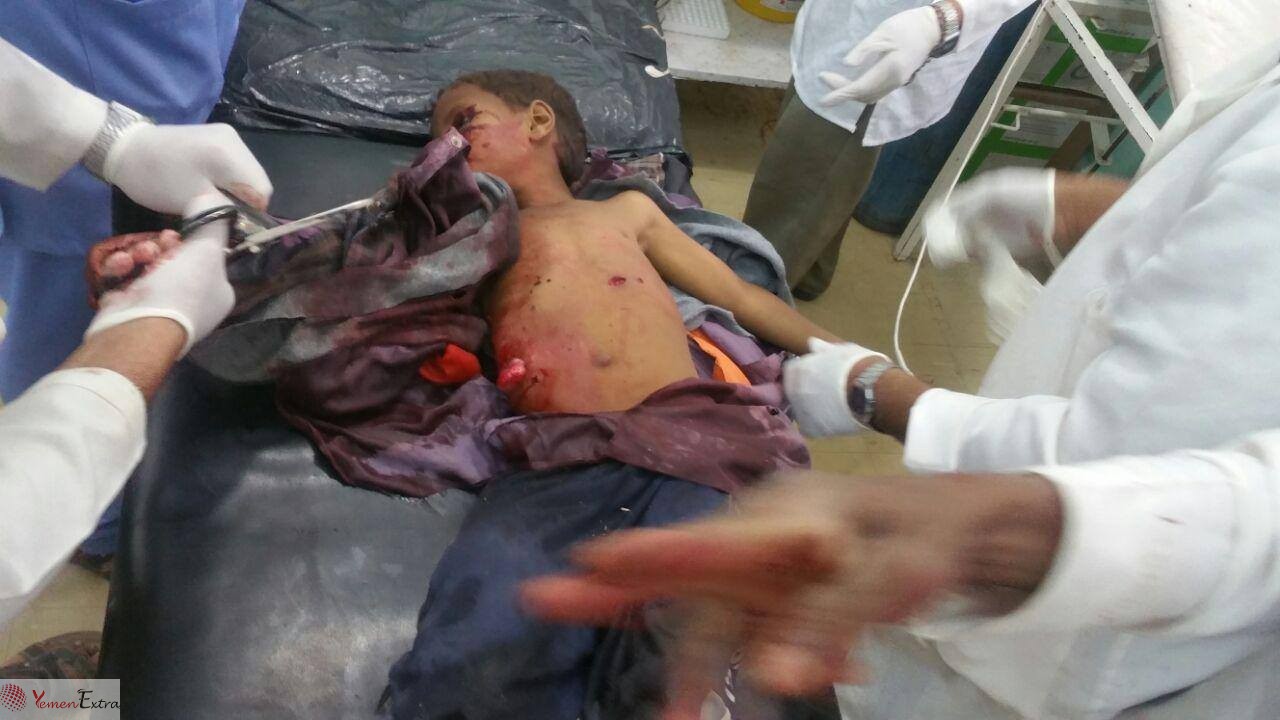www.aljazeerah.info
News, October 2019
Archives
Mission & Name
Conflict Terminology
Editorials
Gaza Holocaust
Gulf War
Isdood
Islam
News
News Photos
Opinion Editorials
US Foreign Policy (Dr. El-Najjar's Articles)
www.aljazeerah.info
|
Editorial Note: The following news reports are summaries from original sources. They may also include corrections of Arabic names and political terminology. Comments are in parentheses. |
As UAE Forces Withdraw from Yemen Taking Dragon's Blood trees with them, Saudis and Hadi Government Replace them
October 25, 2019
 |
 |
| A Yemeni child victim of a Saudi cluster-bomb air strike, October 24, 2019 |
UN envoy, Griffiths, discusses Yemen peace agreements with Saudi defense inister, Khalid bin Salman, October 25, 2019 |
 |
|
| Dragon's Blood trees,
native only to Yemen’s Socotra island, were taken from the island to be displayed in Abu Dhabi, UAE, October 25, 2019 |
***
The following news stories are from the Yemeni independent website Al-Masdar ( http://www.almasdaronline.com/category/42 ):
***
Griffiths discusses with 'Khalid bin Salman' the political process in Yemen and Stockholm Agreement
October 25, 2019, Al-Masdar online- News Room ٢٥ ÃßÊæÈÑ ٢٠١٩
The UN envoy to Yemen, Martin Griffiths, discussed the political process and efforts to implement the Stockholm Agreement with Saudi Deputy Defense Minister Khalid bin Salman in Riyadh.
In a statement, Griffiths said he met yesterday in Riyadh with Prince Khalid bin Salman and discussed with him ways to support the political process as well as efforts to implement the Stockholm Agreement.
Griffiths noted the efforts of the United Nations and the International Committee of the Red Cross (ICRC) in implementing the prisoner and detainee exchange agreement and the challenges and opportunities facing this important humanitarian issue.
The UN envoy stressed the importance of making progress on this humanitarian issue, which affects the lives of thousands of Yemeni families and called on "all parties to show the necessary flexibility to allow for the start of a comprehensive exchange of detainees as soon as possible."
During the meeting, the UN envoy presented progress in implementing the Hodeidah Agreement, particularly with regard to the implementation of the ceasefire monitoring mechanism and the positive impact of this step on the protection of civilians, on the strengthening of humanitarian action and in providing the appropriate atmosphere to support confidence-building measures in this area.
Griffiths listened to a briefing from Bin Salman on the kingdom's efforts to mediate a solution to the situation in the south.
The UN envoy praised the kingdom's great efforts in this area, stressing the centrality of the Saudi role led by the crown prince in supporting the UN's efforts to reach a political solution to the crisis in Yemen."
"Al-Maysari" and "Jabwani" arrived in Ataq In conjunction with news of the signing of an agreement with the Southern Transitional
October 25, 2019, ALMASDARONLINE ٢٥ ÃßÊæÈÑ ٢٠١٩
Deputy Prime Minister and Interior Minister Ahmed Al- Maysari and Transport Minister Saleh al-Jabwani arrived Friday morning in the city of Ataq, the center of the southeastern province of Shabwa, in conjunction with reports of the signing of an agreement between the Yemeni government and the southern transitional council.
The two ministers were greeted upon their arrival by army and security leaders, executive office managers and a number of social figures.
The two ministers arrived in a large delegation from Sieyun in Hadhramaut valley.
A source said that the visit comes as part of a program of visits by al- Maysari in a number of liberated provinces.
The two ministers' arrival coincides with reports of an agreement signed with the southern transitional and Yemeni government to end the crisis in Aden in southern Yemen.
Two batches of Saudi soldiers arrive at Aden International Airport
October 25, 2019, ALMASDARONLINE ٢٤ ÃßÊæÈÑ ٢٠١٩
Dozens of Saudi soldiers arrived at Aden International Airport on Tuesday evening and Wednesday morning aboard Saudi military aircraft.
A special source at Aden airport told "Al-Masdar Online" that more than 100 Saudi soldiers arrived at the city's international airport on a military plane before being transported and distributed to the headquarters of the Arab Coalition forces in the Directorate of Al-Buraiqa, west of Aden, and the military base al-Anad located in Lahj province to the north of Aden.
According to the source, some of these soldiers are likely to be kept inside the international airport along with Saudi military units that received airport security from UAE forces last week.
***
The following news stories are from the pro-Houthi website Yemen Extra (http://www.yemenextra.net/):
***
Saudi-led coalition continues killing Yemenis with banned munitions
October 24, 2019, YemenExtra, Y.A
A child was killed and two others were injured on Thursday by a cluster bomb that is remained of the US-Saudi aggression in Tuhayta of Hodeidah.
Cluster bombs, which have been launched by the aggression on Yemen for five years, are among the most serious threats that end the lives of citizens, which often kills the children.
Dozens of citizens, most of them children, were killed and wounded by cluster bombs that are dropped by US-Saudi aggression on various Yemeni governorates
The spokesman for Yemeni Armed Forces says the Saudi-led military coalition continues to use internationally-banned weapons, particularly cluster bombs, in its aerial bombardment of residential neighborhoods in Yemen despite a global outcry against the use of such munitions by Saudi Arabia and its allies.
The National Committee for Demining (NCD) held a ceremony in Sana’a on Thursday to mark the World Day for Mine Awareness under the slogan “For a Yemen Mine-free”.
Mohammed Al-Amoudi, director of the Victim Assistance Department of the NCD, said that the US-Saudi aggression used cluster bombs on Yemen from the first time, where the number of raids used by coalition aircraft was 1070 cluster bombs and the number of civilian casualties was 1,096 civilians over the past four years.
Al-Amoudi added that the NCD center has worked to spread awareness through several workshops and courses on the dangers of this devastating weapon. The number of beneficiaries of the awareness reached 77547 beneficiaries in different governorates of the Republic, in addition to benefiting 4959106 people from the field survey.
The US-Saudi aerial aggression launched a series of airstrikes using cluster munitions early hours of Thursday morning in Manbah border district of Saadah governorate.
Local sources in the district said that the cluster bombs scattered over the citizens’ houses and farms, causing damages in property.
Cluster bombs impose threat for civilians life in the region.
Amnesty International has accused the US-Saudi aggression of using internationally banned weapons in Yemen.
In March 2015, the US -backed –Saudi-led coalition started a war against Yemen with the declared aim of crushing the Houthi Ansarullah movement, who had taken over from the staunch Riyadh ally and fugitive former president Abd Rabbuh Mansur Hadi, while also seeking to secure the Saudi border with its southern neighbor. Three years and over 600,000 dead and injured Yemeni people and prevented the patients from travelling abroad for treatment and blocked the entry of medicine into the war-torn country, the war has yielded little to that effect.
Despite the coalition claims that it is bombing the positions of the Ansarullah fighters, Saudi bombers are flattening residential areas and civilian infrastructures.
More than 2,200 others have died of cholera, and the crisis has triggered what the United Nations has described as the world’s worst humanitarian disaster.
Saudi-Led Coalition Launches Series of Raids on Razih in Saada
Oct 23, 2019, YemenExtra, M.A.
The Saudi-led coalition conducted on Tuesday 4 raids on Razih district in Saada province.
A citizen was killed in the aforementioned Saudi American raids on Razih district in Sa’ada province.
In addition, Saudi missiles and artillery shells targeted populated villages in Razih district.
Saudi-Led Coalition Commits Fresh War Crime in Saada
Oct 23, 2019, YemenExtra, M.A.
The Saudi-led coalition on Monday targeted a citizen’s car, killing 5 people, including women and children, preliminary toll listed a child and a pregnant woman in Kotaf.
Another citizen was killed in a raid conducted by the US-Saudi aggression on Razih district in Sa’ada province.
This comes in the context of the crimes committed by the US-backed coalition against the Yemeni people on a daily basis, for more than four years, amid the silence of the international community.
***
Yemeni childern between the jaws of Saudi-led coalition
Oct 24, 2019, YemenExtra, Y.A
A child under the age of five dies every 12 minutes in Yemen due to the humanitarian crisis caused by the US-Saudi aggression, Achim Steiner, the representative of the United Nations Development Program (UNDP) in Yemen, said Wednesday.
“A child under 5 years of age dies every 12 minutes in Yemen, mostly as a result of lack of water, basic nutrition, health care and medicines due to the conflict,” Steiner said in a tweet.
Yemen is experiencing the largest humanitarian crisis in the world because of the US-Saudi aggression against Yemen for nearly five years.
Lacking body-mass and unreal weights, this is how Children looked like in malnutrition departments in Yemeni government hospitals. They face these complications in the provision of health care as required due to lack of medical supplies and the influx of medical conditions on an ongoing basis.
“The department receives from 30 to 35 cases and we have only 24 beds,” said Dr. Amin El-Ezari, who is in charge of the malnutrition department at Al-Sabaeen Hospital.
Officials at the Yemeni Ministry of Health confirmed high indicators of malnutrition among children in various regions as a result of deteriorating living conditions, cuts in salaries and the continuation of the Saudi blockade, which leads to serious long-term health complications for these children, such as immunodeficiency, weak organ functions, low level of intelligence and others.
Yemeni childern suffering due to the Saudi-led coalition, backed by the US, war on Yemen
A press conference was held in Hodeidah province on Thursday to highlight the rape and abduction crimes that are committed by Saudi-Emirati coalition forces against women and children in the province.
In the conference, Acting Governor Mohammed Ayash Quhim praised the conference idea to review the coalition crimes in the west coast, including the rape of women and children, the abduction of men, and to expose the aggression forces before the United Nations.
For her part, Director of the Human Rights Office in the province Amal Ma’jam said that the crimes and violations of the aggression coalition, the latest of which was in Tuhita district, were not the first in full view of the international community, which did nothing to stop and hold perpetrators accountable.
Fabricating crises is a method used by the coalition of aggression and its mercenaries to put pressure on civilians. The siege imposed on the city and the control of people’s livelihood have made famine very widespread among the population, especially the majority of children.
Khawla, the slender body that fights death, is a testament to the brutality of the siege and the death of the international conscience, which is silent on many of these situations.
Awsan Al-Absi, a nutritionist at the General Revolution Hospital, said: “The condition of this child has been exacerbated by the inability of parents to rescue this case on time due to the siege on Hodeidah.”
Yemeni child suffers from deadly disease during the Saudi-led coalition, backed by the US, campagain against his country since 2015
As the new school year starts amid continuing violence in Yemen, 2 million children are out of school, including almost half a million who dropped out since the start of the US-Saudi coalition in March 2015.
The education of another 3.7 million children now hangs in the balance as teachers’ salaries have not been paid in over two years.
On March 26, 2015, Saudi Arabia announced from Washington its aggression against Yemen, targeting all aspects of life, infrastructure, commercial and industrial establishments, and imposed an economic blockade on the country by closing airports.
At least 335 children have been killed and another 590 injured by US-Saudi violent attacks including airstrikes, mines and shelling an airstrike hit a bus in Sa’ada killing 41 school children, equivalent to another eight buses being hit, according to Oxfam International, citing data from the UN Civilian Impact Monitoring Project.
Many more have died from hunger and disease in a massive humanitarian crisis stoked by the aggression.
“The world was rightly appalled by an attack that took the lives of so many young, innocent schoolchildren. Yet almost one child a day has been killed in the year since and violence remains a daily threat for Yemenis, alongside the struggle against hunger and disease,” Muhsin Siddiquey, Oxfam’s Yemen Country Director said.
Yemeni suffering due to the Saudi-led coalition campaign, backed by the US, against Yemen since 2015.
At least 20 million children worldwide missed out on lifesaving vaccinations last year due to a combination of conflict, lack of access and complacency, the United Nations has warned.
According to data from Unicef and the World Health Organization, vulnerable children living in remote rural areas, urban slums and unstable regions are disproportionately affected by gaps in coverage.
Globally, since 2010, vaccination coverage with three doses of diphtheria, tetanus and pertussis (DTP3) and one dose of the measles vaccine has stalled at around 86 percent, the World Health Organization said. “While high, this is not sufficient. 95 percent coverage is needed – globally, across countries, and communities – to protect against outbreaks of vaccine-preventable diseases.”
The brutal aggression against Yemen has worsened the humanitarian situation for civilians in the country, with at least 193 children having died this year from cholera-related illnesses, according to Save the Children.
In a statement on Monday, the U.K. charity revealed that the country has seen more suspected cholera cases in the first half of this year than in the whole of 2018. A total of 439,812 suspected cholera cases have so far been identified, with some 203,000 children among those affected, Save the Children said. As Yemenis have suffered from acute malnutrition, the report noted that malnourished children are at least three times more likely to die due to their weakened immune systems.
In March 2015, the US -backed –Saudi-led coalition started a war against Yemen with the declared aim of crushing the Houthi Ansarullah movement, who had taken over from the staunch Riyadh ally and fugitive former president Abd Rabbuh Mansur Hadi, while also seeking to secure the Saudi border with its southern neighbor. Three years and over 600,000 dead and injured Yemeni people and prevented the patients from travelling abroad for treatment and blocked the entry of medicine into the war-torn country, the war has yielded little to that effect.
Despite the coalition claims that it is bombing the positions of the Ansarullah fighters, Saudi bombers are flattening residential areas and civilian infrastructures.
More than 2,200 others have died of cholera, and the crisis has triggered what the United Nations has described as the world’s worst humanitarian disaster.
***
Share the link of this article with your facebook friendsFair Use Notice
This site contains copyrighted material the
use of which has not always been specifically authorized by the copyright
owner. We are making such material available in our efforts to advance
understanding of environmental, political, human rights, economic,
democracy, scientific, and social justice issues, etc. We believe this
constitutes a 'fair use' of any such copyrighted material as provided for
in section 107 of the US Copyright Law. In accordance with Title 17 U.S.C.
Section 107, the material on this site is
distributed without profit to those
who have expressed a prior interest in receiving the included information
for research and educational purposes. For more information go to: http://www.law.cornell.edu/uscode/17/107.shtml.
If you wish to use copyrighted material from this site for purposes of
your own that go beyond 'fair use', you must obtain permission from the
copyright owner.
|
|
|
|
||
|
||||||


